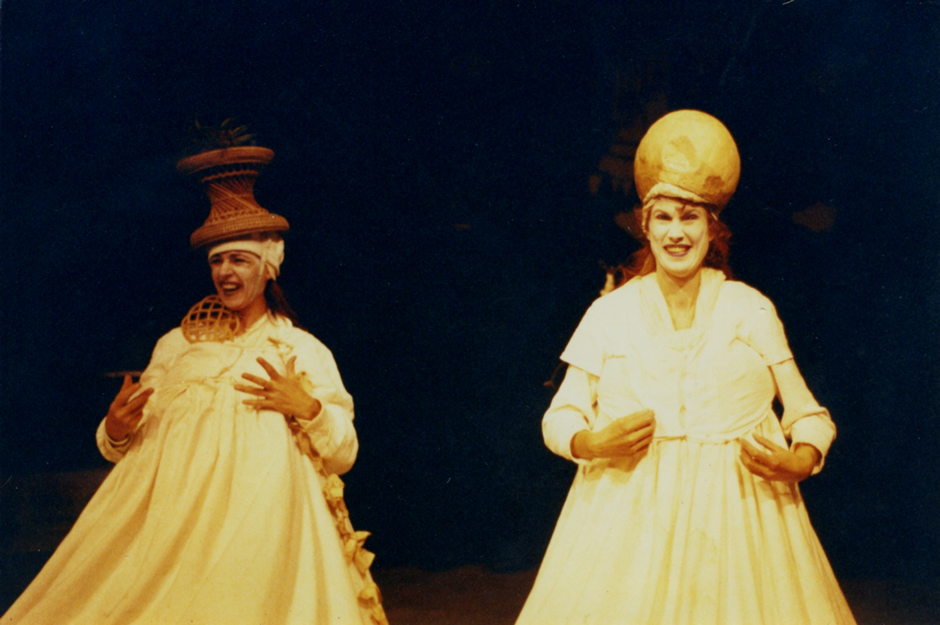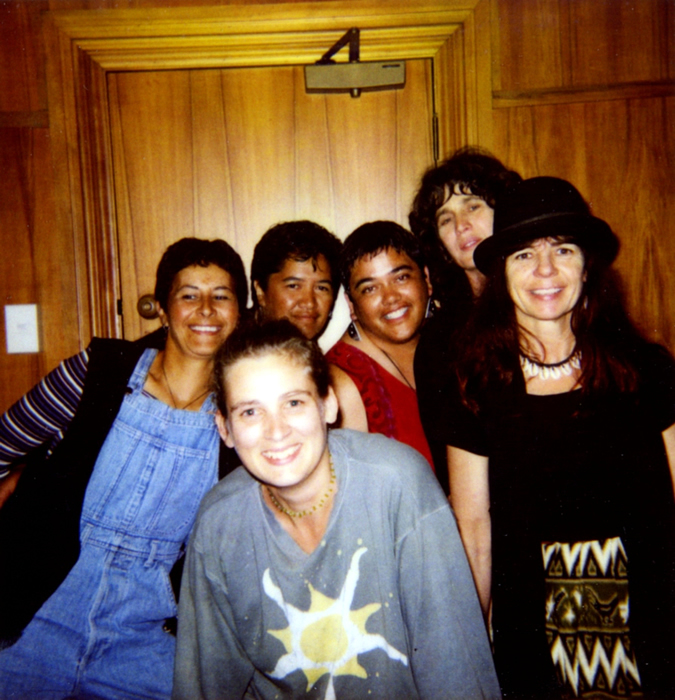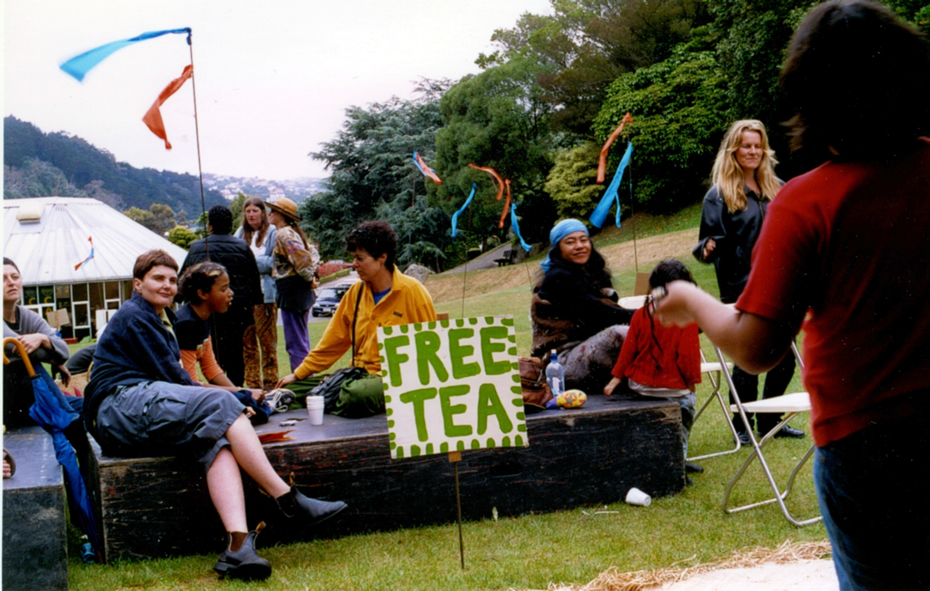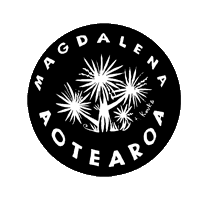Magdalena Aotearoa was formed in 1997 by Wellington-based theatre makers Sally Rodwell and Madeline McNamara to ‘encourage and promote the work of women in the performing arts in Aotearoa New Zealand’. [1]
The seed for it had been planted a few years earlier, when a book from the Wellington public library, Magdalena: international women's experimental theatre, introduced Sally and Madeline to the Magdalena Project, founded in Wales by Jill Greenhalgh in 1986. Drawn to this ‘dynamic cross-cultural network, providing a platform for women’s performance work, a forum for critical discussion, and a source of support, inspiration and performance training’, Sally and Madeline travelled to Cardiff in 1994 to perform their work Crow Station at the Magdalena ‘94 festival. [2]

Magdalena Aotearoa collection.
Sally Rodwell (left) and Madeline McNamara (right) performing Crow Station, date unknown.
Following further international touring of Crow Station, and a visit by Jill Greenhalgh to New Zealand in March 1997, Magdalena Aotearoa was born, along with plans to hold an international festival of women’s performance in Wellington. [3] Magdalena Aotearoa initially operated from Room 19 in Trades’ Hall on Vivian Street, originally the home of many unions, which included classrooms for the Workers’ Educational Institute. [4] It was a fitting venue for an organisation that advocated for, brought together and offered development opportunities to women working in the performing arts.

Magdalena Aotearoa collection.
Magdalena Aotearoa International Festival of Women’s Performance organising team at Trades’ Hall, Wellington, 1998.
For two years Sally, Madeline and a collection of other women, including Lisa Maule (as Technical Director), Helen Varley Jamieson, Celia West, Te Itirawa Nepia, Katarina Kawana and Parekotuku Moore, organised ‘the ridiculously overly ambitious but ultimately awe inspiring’ Magdalena Aotearoa International Festival of Women’s Performance, which took place in 1999. [5] Part of the festival’s philosophy was based on the women’s own experiences of travel: ‘[E]ach artist must be warmly welcomed, have a peaceful room, a sensible schedule, skilled crew, good venue, meet local people, and have time for things “touristic”.’ [6] A film documenting the festival, Crazy Voyage (made by Sally and her partner Alan Brunton), shows an office full of paper and women busy organising, then scenes at Wellington airport with performers from around the world being greeted with warm embraces. Between 21 March and 3 April 1999, over 40 performances and art events took place across multiple venues, including a shop window in Newtown. For the final weekend the festival moved from Wellington to Paekākāriki, where tangata whenua hosted three days of ‘workshops, performances and partying’. [7] Madeline recalled that:
Much of the work of setting up Magadalena Aotearoa was done in the context of creating partnerships with Māori women, understanding and exploring what a bi-cultural partnership means. Much work and organisational skill went into creating this relationship, which laid the ground work for an essential part of our festival in 1999 and ongoing connections within the Magdalena. [8]
From 2000, members regularly participated in international Magdalena festivals around the world. Over the next 20 years, Magdalena Aotearoa did not put on another event on such a grand scale as in 1999, but continued to host visiting Magdalena artists from various countries, including Switzerland, Norway, Spain, Serbia and the Dominican Republic. Between 2006 and 2010 Magdalena Aotearoa held various workshops and ‘Gatherings’, including professional development workshops in Auckland and Wellington for women theatre practitioners. The Gatherings operated on a ‘shoestring budget with a D.I.Y. philosophy and a blackboard programme . . . finalised on the first day of the event’. They offered an opportunity for women in the performing arts to show work-in-progress, give and receive feedback, take part in workshops, attend panel discussions, network, and support each other. [9]

Magdalena Aotearoa collection.
A Magdalena Aotearoa gathering in The Dell, Wellington Botanic Garden, date unknown.
Sally Rodwell died in 2006. The loss of her dynamism and energy was felt within both Magdalena Aotearoa and the wider Magdalena community. Like other Magdalena Aotearoa members, Sally had contributed a number of written pieces to the Magdalena Project’s journal, The Open Page, published annually between 1996 and 2008, and a farewell to her was published in the journal’s 2007 issue. [10] In 2010 Magdalena Aotearoa’s own regular newsletter, published in hard copy two to four times a year and posted out to subscribers, wound down. Online activity continued through the Magdalena Project’s website (managed by ‘web queen’ Helen Varley Jamieson) and Facebook page.
In 2018 Magdalena Aotearoa hosted a script development workshop for Women like us, a play about women in Parliament, originally written by Helen Varley Jamieson for the 1993 centenary of women’s suffrage. The redevelopment of the script, retitled The fifty percent party, received funding from the Suffrage 125 Community Fund, administered by the Ministry for Women to recognise 125 years of women’s suffrage in New Zealand. As well as the playwright, the Women like us workshop involved longtime Magdalena Aotearoa Trust members Madeline McNamara, Lisa Maule and Lilicherie McGregor. Many Trust members had been involved in a variety of ways since Magdalena Aotearoa’s inception (for example as performers, designers, producers and newsletter editors) and played a key role in Magdalena Aotearoa’s survival and maintaining its international connections.
From the beginning, Magdalena Aotearoa adapted and evolved along with the focus of its core Trust members and the needs of the wider community of women in the performing arts in New Zealand. Trust member Lisa Maule noted that:
the work of Magdalena Aotearoa has always seemed amorphous. Structure, purpose and output have always been able to change. However, throughout persists the thread of exchange … In some ways Magdalena exists for the exchange of ideas and inspiration. [11]
By 2019 this exchange had occurred in person through festivals, workshops, ‘Gatherings’ and individual performance seasons, through articles, newsletters and online resources including the website and Facebook page, and through the very existence of a network of women forging their own creative path in what can be a very challenging industry.
Twenty years after the major 1999 festival, many of the women involved were still making, performing, leading, influencing and pushing boundaries in the performing arts in New Zealand and abroad. As newer generations of women began to arrive and make their mark, they may not have been aware of Magdalena Aotearoa specifically, but they undoubtedly learned from and worked with some of the broad network of women who had enjoyed formative experiences and developed their practice as a result of Magdalena Aotearoa.
Cherie Jacobson
Notes
[1] Magdalena Aotearoa home page, http://www.magdalenaaotearoa.org.nz/
[2] See The Magdalena Project home page, https://www.themagdalenaproject.org/
Fry, 2007, pp. 232, 246-49, covers the contribution of Sally Rodwell and Madeline McNamara’s company the Toadlilies.
[3] Rodwell, Sally, 1998, 2002.
[4] Wellington City Heritage, ‘Wellington Trades’ Hall Building’, Wellington City Council, 21 Dec. 2016, http://www.wellingtoncityheritage.org.nz/buildings/301-450/321-wellington-trades-hall-building
[5] McNamara, Madeline, 2007.
[6] Rodwell, 2002.
[7] Magdalena Aotearoa, ‘1999 Magdalena Aotearoa International Festival of Women’s Performance’, Festival Highlights, in Category: Festival 1999, http://www.magdalenaaotearoa.org.nz/category/festival-1999/
[8] McNamara, Madeline, 2017.
[9] Magdalena Aotearoa, ‘Recharge: The Gathering 2009’, http://www.magdalenaaotearoa.org.nz/archive/recharge-the-gathering-2009/
[10] McNamara, 2007.
[11] Maule, 2017.
Published sources
Basnett, Susan (ed.), Magdalena: international women's experimental theatre, Berg, Oxford, 1992
Fry, Chris, The way of Magdalena, Odin Teatrets Forlag/Open Page Publications, Holstenbro, 2007
Magdalena Aotearoa newsletters, 1997–2010, National Library of New Zealand, Wellington, and http://www.magdalenaaotearoa.org.nz/activities/newsletter/
Maule, Lisa, ‘I Did the Lighting’, Playmarket Annual 2017, No. 52, 25 May 2018, https://issuu.com/playmarket/docs/plm.00952_playmarket_annual_52_issu
McNamara, Madeline, ‘Turning Tables’, The Open Page, Issue 8, 2003, pp. 92–94, posted on The Magdalena Project, https://themagdalenaproject.org/sites/default/files/OP8_MadelineMcNamara.pdf
McNamara, Madeline, ‘Sally Rodwell: In Memory’, The Open Page, Issue 12, 2007, posted on The Magdalena Project, https://www.themagdalenaproject.org/sites/default/files/OP12_InMemoryofSallyRodwell.pdf
McNamara, Madeline, ‘Divine Doubt’, in Future conditional – notes for tomorrow: an anthology of women in theatre, The Open Page Publications, Holstebro, 2017, pp. 107–19
McNamara, Madeline and Lilicherie McGregor, ‘The Spaces Between’, in The Magdalena Project @ 25: legacy and challenge, The Open Page Publications, Holstebro, 2011
Rodwell, Sally, ‘A Week In Wellington’, The Open Page, Issue 3, 1998, pp. 28–32, posted on The Magdalena Project, https://www.themagdalenaproject.org/sites/default/files/OP3_Rodwell.pdf
Rodwell, Sally, ‘Roads, Wheels, Roundabouts’, The Open Page, Issue 7, 2002, pp. 130–35, posted on The Magdalena Project, https://www.themagdalenaproject.org/sites/default/files/OP7_SallyRodwell.pdf
Rodwell, Sally and Alan Brunton (directors), Crazy voyage (film, 1 hr 24 mins), Red Mole Theatre, 2001. Uploaded to YouTube 4 April 2013, https://www.youtube.com/watch?v=gnjJCyqzMP0
The Magdalena Project, https://www.themagdalenaproject.org/
The Open Page, The Magdalena Project, https://themagdalenaproject.org/en/content/open-page
Further sources
Magdalena Aotearoa website: http://www.magdalenaaotearoa.org.nz/
Magdalena Aotearoa Facebook page: https://www.facebook.com/magdalenaaotearoa/


Community contributions